北师大版(2024)八年级上册英语Unit3 Feelings and Emotions单元语法填空专项训练(含解析)
文档属性
| 名称 | 北师大版(2024)八年级上册英语Unit3 Feelings and Emotions单元语法填空专项训练(含解析) | 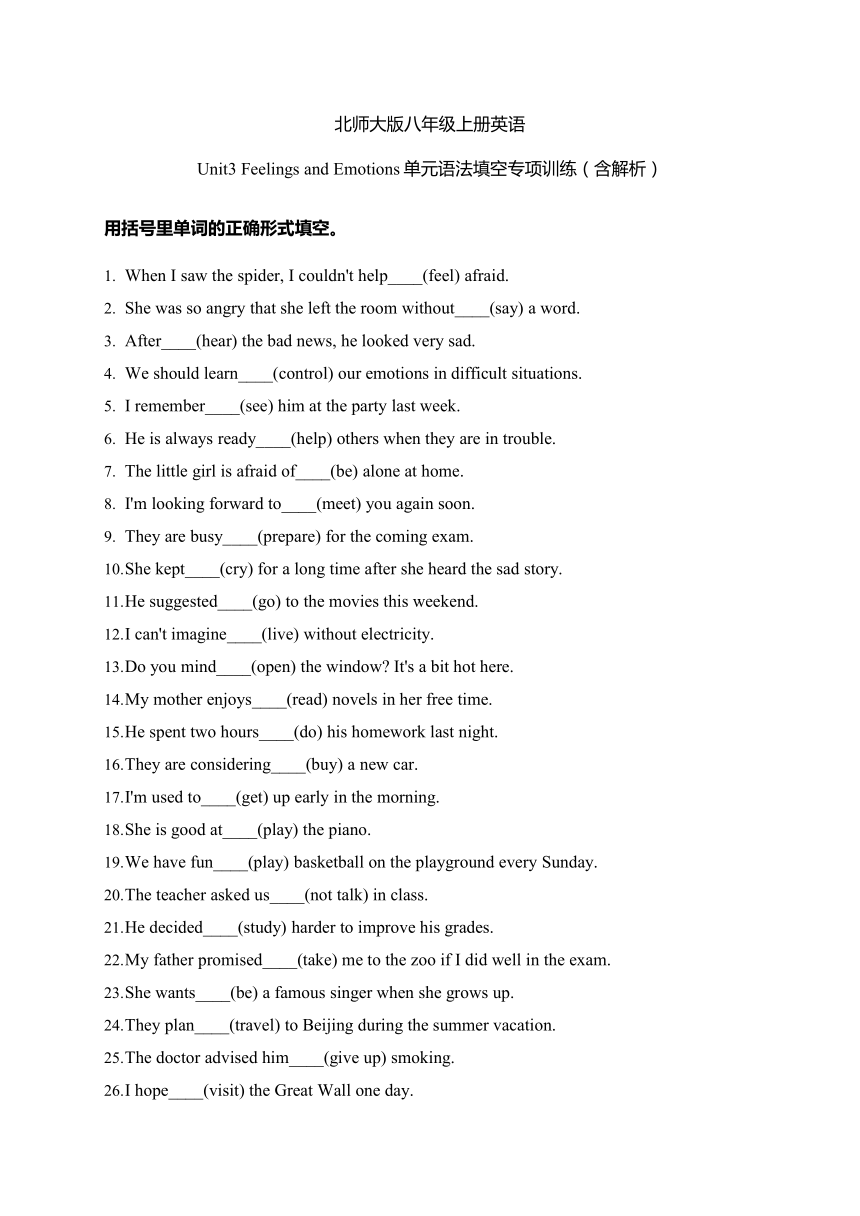 | |
| 格式 | docx | ||
| 文件大小 | 25.2KB | ||
| 资源类型 | 教案 | ||
| 版本资源 | 北师大版 | ||
| 科目 | 英语 | ||
| 更新时间 | 2025-08-18 22:30:32 | ||
图片预览

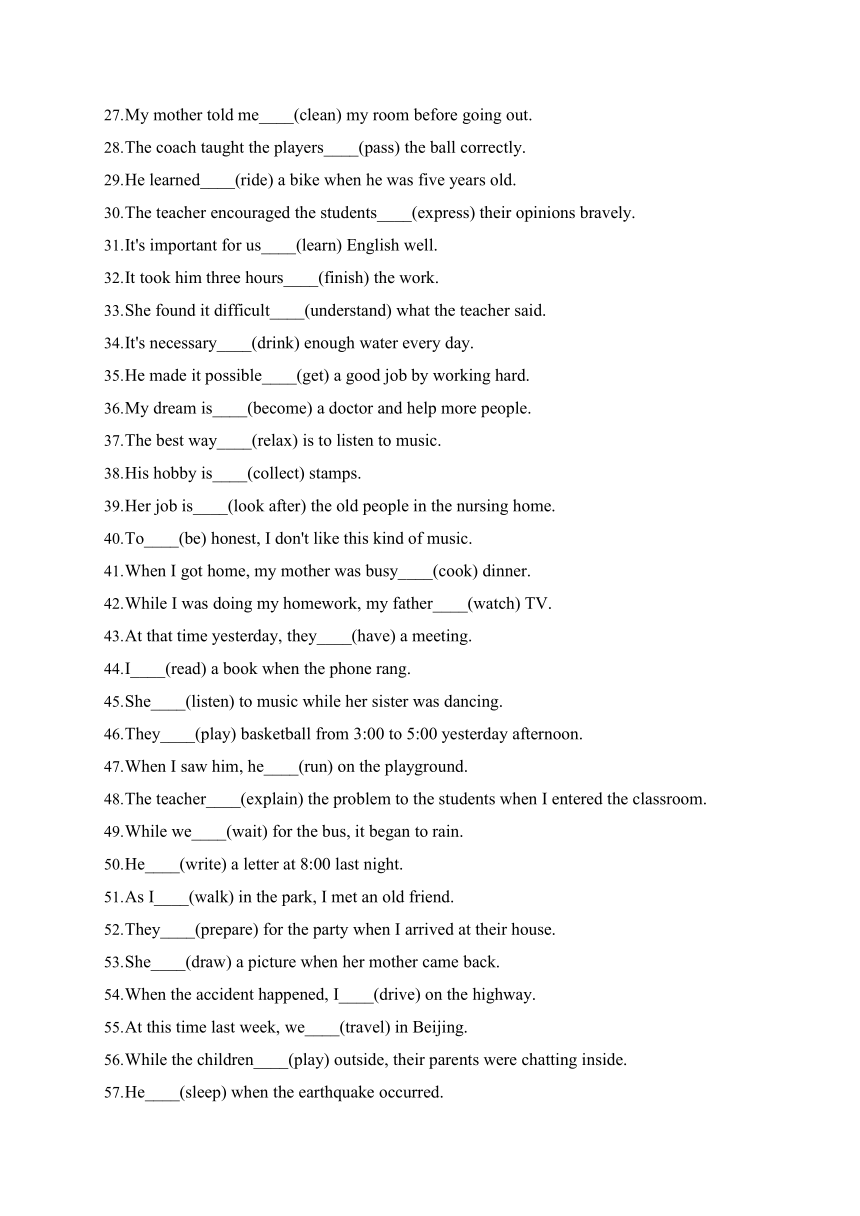
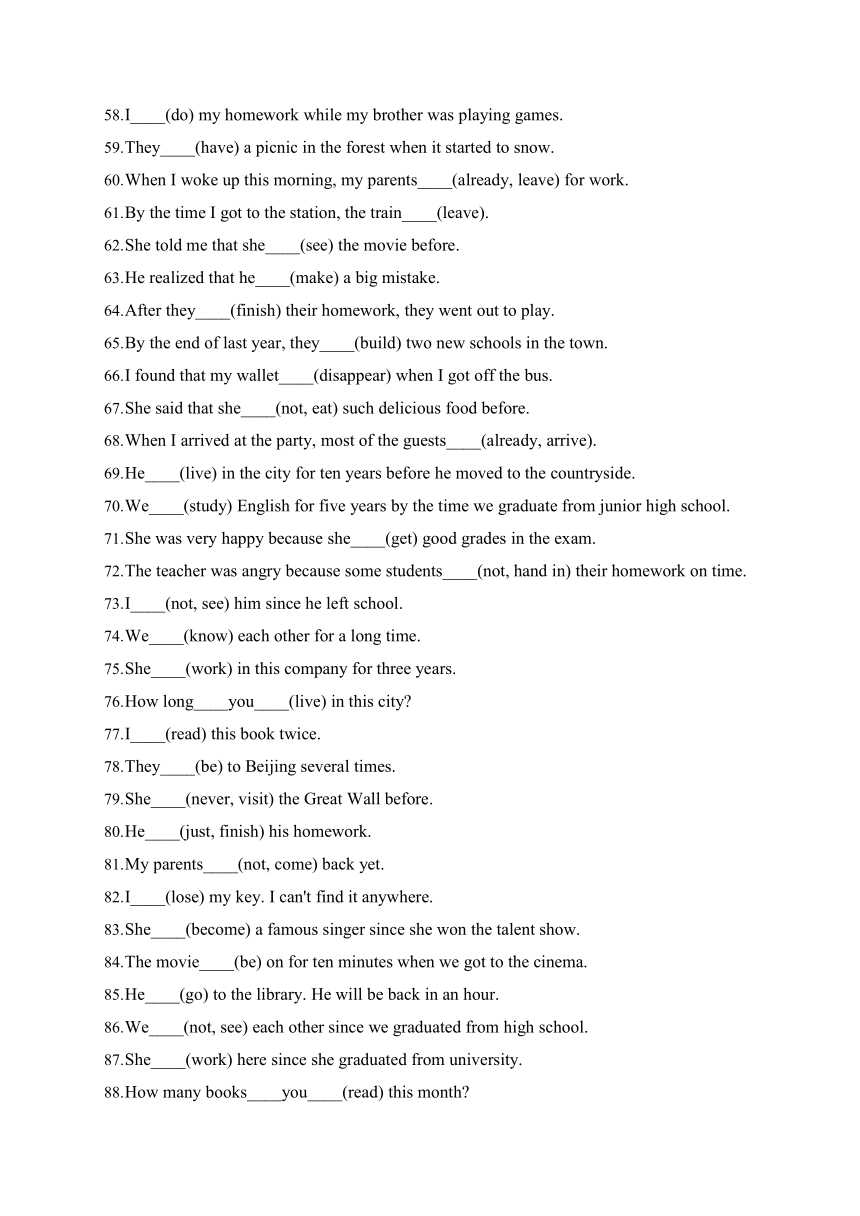
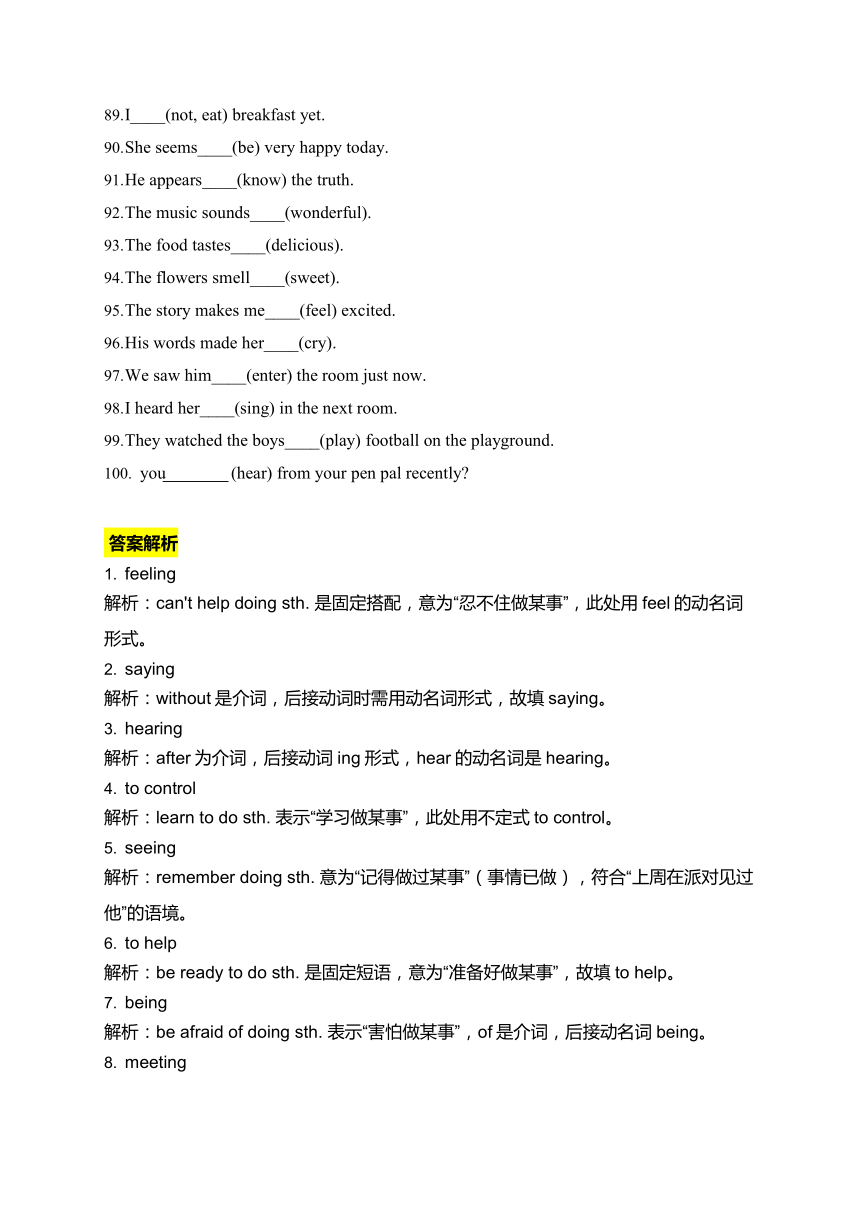
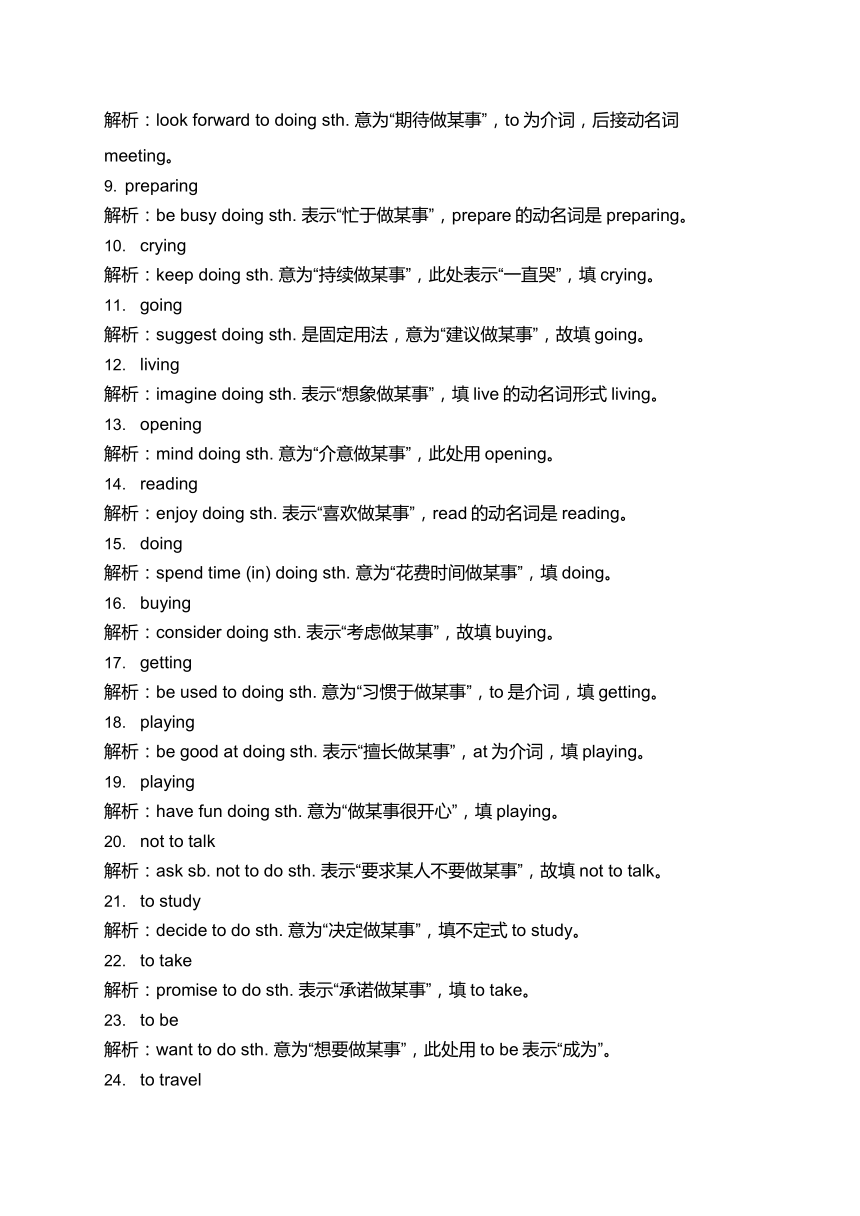
文档简介
北师大版八年级上册英语
Unit3 Feelings and Emotions单元语法填空专项训练(含解析)
用括号里单词的正确形式填空。
When I saw the spider, I couldn't help____(feel) afraid.
She was so angry that she left the room without____(say) a word.
After____(hear) the bad news, he looked very sad.
We should learn____(control) our emotions in difficult situations.
I remember____(see) him at the party last week.
He is always ready____(help) others when they are in trouble.
The little girl is afraid of____(be) alone at home.
I'm looking forward to____(meet) you again soon.
They are busy____(prepare) for the coming exam.
She kept____(cry) for a long time after she heard the sad story.
He suggested____(go) to the movies this weekend.
I can't imagine____(live) without electricity.
Do you mind____(open) the window It's a bit hot here.
My mother enjoys____(read) novels in her free time.
He spent two hours____(do) his homework last night.
They are considering____(buy) a new car.
I'm used to____(get) up early in the morning.
She is good at____(play) the piano.
We have fun____(play) basketball on the playground every Sunday.
The teacher asked us____(not talk) in class.
He decided____(study) harder to improve his grades.
My father promised____(take) me to the zoo if I did well in the exam.
She wants____(be) a famous singer when she grows up.
They plan____(travel) to Beijing during the summer vacation.
The doctor advised him____(give up) smoking.
I hope____(visit) the Great Wall one day.
My mother told me____(clean) my room before going out.
The coach taught the players____(pass) the ball correctly.
He learned____(ride) a bike when he was five years old.
The teacher encouraged the students____(express) their opinions bravely.
It's important for us____(learn) English well.
It took him three hours____(finish) the work.
She found it difficult____(understand) what the teacher said.
It's necessary____(drink) enough water every day.
He made it possible____(get) a good job by working hard.
My dream is____(become) a doctor and help more people.
The best way____(relax) is to listen to music.
His hobby is____(collect) stamps.
Her job is____(look after) the old people in the nursing home.
To____(be) honest, I don't like this kind of music.
When I got home, my mother was busy____(cook) dinner.
While I was doing my homework, my father____(watch) TV.
At that time yesterday, they____(have) a meeting.
I____(read) a book when the phone rang.
She____(listen) to music while her sister was dancing.
They____(play) basketball from 3:00 to 5:00 yesterday afternoon.
When I saw him, he____(run) on the playground.
The teacher____(explain) the problem to the students when I entered the classroom.
While we____(wait) for the bus, it began to rain.
He____(write) a letter at 8:00 last night.
As I____(walk) in the park, I met an old friend.
They____(prepare) for the party when I arrived at their house.
She____(draw) a picture when her mother came back.
When the accident happened, I____(drive) on the highway.
At this time last week, we____(travel) in Beijing.
While the children____(play) outside, their parents were chatting inside.
He____(sleep) when the earthquake occurred.
I____(do) my homework while my brother was playing games.
They____(have) a picnic in the forest when it started to snow.
When I woke up this morning, my parents____(already, leave) for work.
By the time I got to the station, the train____(leave).
She told me that she____(see) the movie before.
He realized that he____(make) a big mistake.
After they____(finish) their homework, they went out to play.
By the end of last year, they____(build) two new schools in the town.
I found that my wallet____(disappear) when I got off the bus.
She said that she____(not, eat) such delicious food before.
When I arrived at the party, most of the guests____(already, arrive).
He____(live) in the city for ten years before he moved to the countryside.
We____(study) English for five years by the time we graduate from junior high school.
She was very happy because she____(get) good grades in the exam.
The teacher was angry because some students____(not, hand in) their homework on time.
I____(not, see) him since he left school.
We____(know) each other for a long time.
She____(work) in this company for three years.
How long____you____(live) in this city
I____(read) this book twice.
They____(be) to Beijing several times.
She____(never, visit) the Great Wall before.
He____(just, finish) his homework.
My parents____(not, come) back yet.
I____(lose) my key. I can't find it anywhere.
She____(become) a famous singer since she won the talent show.
The movie____(be) on for ten minutes when we got to the cinema.
He____(go) to the library. He will be back in an hour.
We____(not, see) each other since we graduated from high school.
She____(work) here since she graduated from university.
How many books____you____(read) this month
I____(not, eat) breakfast yet.
She seems____(be) very happy today.
He appears____(know) the truth.
The music sounds____(wonderful).
The food tastes____(delicious).
The flowers smell____(sweet).
The story makes me____(feel) excited.
His words made her____(cry).
We saw him____(enter) the room just now.
I heard her____(sing) in the next room.
They watched the boys____(play) football on the playground.
you (hear) from your pen pal recently
答案解析
feeling
解析:can't help doing sth. 是固定搭配,意为“忍不住做某事”,此处用feel的动名词形式。
saying
解析:without是介词,后接动词时需用动名词形式,故填saying。
hearing
解析:after为介词,后接动词ing形式,hear的动名词是hearing。
to control
解析:learn to do sth. 表示“学习做某事”,此处用不定式to control。
seeing
解析:remember doing sth. 意为“记得做过某事”(事情已做),符合“上周在派对见过他”的语境。
to help
解析:be ready to do sth. 是固定短语,意为“准备好做某事”,故填to help。
being
解析:be afraid of doing sth. 表示“害怕做某事”,of是介词,后接动名词being。
meeting
解析:look forward to doing sth. 意为“期待做某事”,to为介词,后接动名词meeting。
preparing
解析:be busy doing sth. 表示“忙于做某事”,prepare的动名词是preparing。
crying
解析:keep doing sth. 意为“持续做某事”,此处表示“一直哭”,填crying。
going
解析:suggest doing sth. 是固定用法,意为“建议做某事”,故填going。
living
解析:imagine doing sth. 表示“想象做某事”,填live的动名词形式living。
opening
解析:mind doing sth. 意为“介意做某事”,此处用opening。
reading
解析:enjoy doing sth. 表示“喜欢做某事”,read的动名词是reading。
doing
解析:spend time (in) doing sth. 意为“花费时间做某事”,填doing。
buying
解析:consider doing sth. 表示“考虑做某事”,故填buying。
getting
解析:be used to doing sth. 意为“习惯于做某事”,to是介词,填getting。
playing
解析:be good at doing sth. 表示“擅长做某事”,at为介词,填playing。
playing
解析:have fun doing sth. 意为“做某事很开心”,填playing。
not to talk
解析:ask sb. not to do sth. 表示“要求某人不要做某事”,故填not to talk。
to study
解析:decide to do sth. 意为“决定做某事”,填不定式to study。
to take
解析:promise to do sth. 表示“承诺做某事”,填to take。
to be
解析:want to do sth. 意为“想要做某事”,此处用to be表示“成为”。
to travel
解析:plan to do sth. 表示“计划做某事”,填to travel。
to give up
解析:advise sb. to do sth. 意为“建议某人做某事”,填to give up。
to visit
解析:hope to do sth. 表示“希望做某事”,填to visit。
to clean
解析:tell sb. to do sth. 意为“告诉某人做某事”,填to clean。
to pass
解析:teach sb. to do sth. 表示“教某人做某事”,填to pass。
to ride
解析:learn to do sth. 意为“学会做某事”,填to ride。
to express
解析:encourage sb. to do sth. 表示“鼓励某人做某事”,填to express。
to learn
解析:It's important for sb. to do sth. 是固定句型,意为“对某人来说做某事很重要”,填to learn。
to finish
解析:It takes sb. time to do sth. 表示“做某事花费某人时间”,填to finish。
to understand
解析:find it + adj. + to do sth. 中,it是形式宾语,不定式是真正宾语,填to understand。
to drink
解析:It's necessary to do sth. 意为“做某事是必要的”,填to drink。
to get
解析:make it possible to do sth. 表示“使做某事成为可能”,填to get。
to become
解析:不定式作表语,说明dream的具体内容,填to become。
to relax
解析:the way to do sth. 意为“做某事的方法”,填to relax。
collecting
解析:动名词作表语,说明hobby的内容,填collecting。
to look after
解析:不定式作表语,说明job的具体内容,填to look after。
be
解析:to be honest是固定短语,意为“说实话”,填be。
cooking
解析:be busy doing sth. 表示“忙于做某事”,填cooking。
was watching
解析:while引导的时间状语从句中,主句用过去进行时(与从句的过去进行时呼应),表示“当……时正在做某事”,填was watching。
were having
解析:at that time yesterday表示“昨天那个时候”,用过去进行时,填were having。
was reading
解析:when引导的从句用一般过去时,主句用过去进行时,表“当某事发生时,另一件事正在进行”,填was reading。
was listening
解析:while引导的从句用过去进行时,主句也用过去进行时,表“同时进行的动作”,填was listening。
were playing
解析:from 3:00 to 5:00 yesterday afternoon表示过去某段时间内持续的动作,用过去进行时,填were playing。
was running
解析:when引导的从句用一般过去时,主句用过去进行时,表“看到他时,他正在跑步”,填was running。
was explaining
解析:when引导的从句用一般过去时,主句用过去进行时,表“进入教室时,老师正在讲解”,填was explaining。
were waiting
解析:while引导的从句用过去进行时,表“正在等公交时,天下雨了”,填were waiting。
was writing
解析:at 8:00 last night表示“昨晚8点”,用过去进行时,填was writing。
was walking
解析:as引导的从句用过去进行时,表“正在公园散步时,遇到了朋友”,填was walking。
were preparing
解析:when引导的从句用一般过去时,主句用过去进行时,表“到达时,他们正在准备派对”,填were preparing。
was drawing
解析:when引导的从句用一般过去时,主句用过去进行时,表“妈妈回来时,她正在画画”,填was drawing。
was driving
解析:when引导的从句用一般过去时,主句用过去进行时,表“事故发生时,我正在开车”,填was driving。
were traveling
解析:at this time last week表示“上周这个时候”,用过去进行时,填were traveling。
were playing
解析:while引导的从句用过去进行时,表“孩子们正在外面玩时,父母在里面聊天”,填were playing。
was sleeping
解析:when引导的从句用一般过去时,主句用过去进行时,表“地震发生时,他正在睡觉”,填was sleeping。
was doing
解析:while引导的从句用过去进行时,主句也用过去进行时,表“我做作业时,弟弟在玩游戏”,填was doing。
were having
解析:when引导的从句用一般过去时,主句用过去进行时,表“开始下雪时,他们正在野餐”,填were having。
had already left
解析:when引导的从句用一般过去时,主句动作发生在从句之前,用过去完成时,填had already left。
had left
解析:by the time引导的从句用一般过去时,主句用过去完成时,表“到车站时,火车已经离开了”,填had left。
had seen
解析:宾语从句中,“看电影”发生在“告诉”之前,用过去完成时,填had seen。
had made
解析:“犯错”发生在“意识到”之前,用过去完成时,填had made。
had finished
解析:after引导的从句动作发生在主句之前,用过去完成时,填had finished。
had built
解析:by the end of last year表示“到去年年底”,用过去完成时,填had built。
had disappeared
解析:“钱包消失”发生在“发现”之前,用过去完成时,填had disappeared。
hadn't eaten
解析:宾语从句中,“没吃过”发生在“说”之前,用过去完成时的否定形式,填hadn't eaten。
had already arrived
解析:when引导的从句用一般过去时,主句动作发生在之前,用过去完成时,填had already arrived。
had lived
解析:before引导的从句用一般过去时,主句用过去完成时,表“搬去乡下之前已住了10年”,填had lived。
will have studied
解析:by the time引导的从句用一般现在时(表将来),主句用将来完成时,填will have studied。
had got
解析:“取得好成绩”发生在“开心”之前,用过去完成时,填had got。
hadn't handed in
解析:“没交作业”发生在“老师生气”之前,用过去完成时的否定形式,填hadn't handed in。
haven't seen
解析:since引导的从句用一般过去时,主句用现在完成时,填haven't seen。
have known
解析:for a long time表示“一段时间”,用现在完成时,填have known。
has worked
解析:for three years表示“三年了”,用现在完成时,主语是she,填has worked。
have; lived
解析:how long提问持续时间,用现在完成时,填have; lived。
have read
解析:twice表示“两次”,用现在完成时,填have read。
have been
解析:several times表示“几次”,用现在完成时,have been to表示“去过某地”,填have been。
has never visited
解析:before表示“之前”,用现在完成时,填has never visited。
has just finished
解析:just表示“刚刚”,用现在完成时,填has just finished。
haven't come
解析:yet表示“还未”,用现在完成时的否定形式,填haven't come。
have lost
解析:“丢钥匙”的动作对现在有影响(找不到),用现在完成时,填have lost。
has become
解析:since引导的从句用一般过去时,主句用现在完成时,填has become。
had been
解析:when引导的从句用一般过去时,主句动作发生在之前且持续了一段时间,用过去完成时,填had been。
has gone
解析:“去了图书馆还没回来”,用has gone to,填has gone。
haven't seen
解析:since引导的从句用一般过去时,主句用现在完成时,填haven't seen。
has worked
解析:since引导的从句用一般过去时,主句用现在完成时,填has worked。
have; read
解析:this month表示“本月(到现在为止)”,用现在完成时,填have; read。
haven't eaten
解析:yet表示“还未”,用现在完成时的否定形式,填haven't eaten。
to be
解析:seem to do sth. 是固定用法,意为“似乎……”,填to be。
to know
解析:appear to do sth. 表示“似乎做某事”,填to know。
wonderful
解析:sound是系动词,后接形容词作表语,填wonderful。
delicious
解析:taste是系动词,后接形容词作表语,填delicious。
sweet
解析:smell是系动词,后接形容词作表语,填sweet。
feel
解析:make sb. do sth. 是固定用法,意为“使某人做某事”,用动词原形feel。
cry
解析:make sb. do sth. 表示“使某人做某事”,用动词原形cry。
enter
解析:see sb. do sth. 意为“看见某人做了某事”(强调全过程),用动词原形enter。
singing
解析:hear sb. doing sth. 表示“听见某人正在做某事”,填singing。
playing
解析:watch sb. doing sth. 意为“观看某人正在做某事”,填playing。
Have; heard
解析:recently表示“最近”,用现在完成时,填Have; heard。
Unit3 Feelings and Emotions单元语法填空专项训练(含解析)
用括号里单词的正确形式填空。
When I saw the spider, I couldn't help____(feel) afraid.
She was so angry that she left the room without____(say) a word.
After____(hear) the bad news, he looked very sad.
We should learn____(control) our emotions in difficult situations.
I remember____(see) him at the party last week.
He is always ready____(help) others when they are in trouble.
The little girl is afraid of____(be) alone at home.
I'm looking forward to____(meet) you again soon.
They are busy____(prepare) for the coming exam.
She kept____(cry) for a long time after she heard the sad story.
He suggested____(go) to the movies this weekend.
I can't imagine____(live) without electricity.
Do you mind____(open) the window It's a bit hot here.
My mother enjoys____(read) novels in her free time.
He spent two hours____(do) his homework last night.
They are considering____(buy) a new car.
I'm used to____(get) up early in the morning.
She is good at____(play) the piano.
We have fun____(play) basketball on the playground every Sunday.
The teacher asked us____(not talk) in class.
He decided____(study) harder to improve his grades.
My father promised____(take) me to the zoo if I did well in the exam.
She wants____(be) a famous singer when she grows up.
They plan____(travel) to Beijing during the summer vacation.
The doctor advised him____(give up) smoking.
I hope____(visit) the Great Wall one day.
My mother told me____(clean) my room before going out.
The coach taught the players____(pass) the ball correctly.
He learned____(ride) a bike when he was five years old.
The teacher encouraged the students____(express) their opinions bravely.
It's important for us____(learn) English well.
It took him three hours____(finish) the work.
She found it difficult____(understand) what the teacher said.
It's necessary____(drink) enough water every day.
He made it possible____(get) a good job by working hard.
My dream is____(become) a doctor and help more people.
The best way____(relax) is to listen to music.
His hobby is____(collect) stamps.
Her job is____(look after) the old people in the nursing home.
To____(be) honest, I don't like this kind of music.
When I got home, my mother was busy____(cook) dinner.
While I was doing my homework, my father____(watch) TV.
At that time yesterday, they____(have) a meeting.
I____(read) a book when the phone rang.
She____(listen) to music while her sister was dancing.
They____(play) basketball from 3:00 to 5:00 yesterday afternoon.
When I saw him, he____(run) on the playground.
The teacher____(explain) the problem to the students when I entered the classroom.
While we____(wait) for the bus, it began to rain.
He____(write) a letter at 8:00 last night.
As I____(walk) in the park, I met an old friend.
They____(prepare) for the party when I arrived at their house.
She____(draw) a picture when her mother came back.
When the accident happened, I____(drive) on the highway.
At this time last week, we____(travel) in Beijing.
While the children____(play) outside, their parents were chatting inside.
He____(sleep) when the earthquake occurred.
I____(do) my homework while my brother was playing games.
They____(have) a picnic in the forest when it started to snow.
When I woke up this morning, my parents____(already, leave) for work.
By the time I got to the station, the train____(leave).
She told me that she____(see) the movie before.
He realized that he____(make) a big mistake.
After they____(finish) their homework, they went out to play.
By the end of last year, they____(build) two new schools in the town.
I found that my wallet____(disappear) when I got off the bus.
She said that she____(not, eat) such delicious food before.
When I arrived at the party, most of the guests____(already, arrive).
He____(live) in the city for ten years before he moved to the countryside.
We____(study) English for five years by the time we graduate from junior high school.
She was very happy because she____(get) good grades in the exam.
The teacher was angry because some students____(not, hand in) their homework on time.
I____(not, see) him since he left school.
We____(know) each other for a long time.
She____(work) in this company for three years.
How long____you____(live) in this city
I____(read) this book twice.
They____(be) to Beijing several times.
She____(never, visit) the Great Wall before.
He____(just, finish) his homework.
My parents____(not, come) back yet.
I____(lose) my key. I can't find it anywhere.
She____(become) a famous singer since she won the talent show.
The movie____(be) on for ten minutes when we got to the cinema.
He____(go) to the library. He will be back in an hour.
We____(not, see) each other since we graduated from high school.
She____(work) here since she graduated from university.
How many books____you____(read) this month
I____(not, eat) breakfast yet.
She seems____(be) very happy today.
He appears____(know) the truth.
The music sounds____(wonderful).
The food tastes____(delicious).
The flowers smell____(sweet).
The story makes me____(feel) excited.
His words made her____(cry).
We saw him____(enter) the room just now.
I heard her____(sing) in the next room.
They watched the boys____(play) football on the playground.
you (hear) from your pen pal recently
答案解析
feeling
解析:can't help doing sth. 是固定搭配,意为“忍不住做某事”,此处用feel的动名词形式。
saying
解析:without是介词,后接动词时需用动名词形式,故填saying。
hearing
解析:after为介词,后接动词ing形式,hear的动名词是hearing。
to control
解析:learn to do sth. 表示“学习做某事”,此处用不定式to control。
seeing
解析:remember doing sth. 意为“记得做过某事”(事情已做),符合“上周在派对见过他”的语境。
to help
解析:be ready to do sth. 是固定短语,意为“准备好做某事”,故填to help。
being
解析:be afraid of doing sth. 表示“害怕做某事”,of是介词,后接动名词being。
meeting
解析:look forward to doing sth. 意为“期待做某事”,to为介词,后接动名词meeting。
preparing
解析:be busy doing sth. 表示“忙于做某事”,prepare的动名词是preparing。
crying
解析:keep doing sth. 意为“持续做某事”,此处表示“一直哭”,填crying。
going
解析:suggest doing sth. 是固定用法,意为“建议做某事”,故填going。
living
解析:imagine doing sth. 表示“想象做某事”,填live的动名词形式living。
opening
解析:mind doing sth. 意为“介意做某事”,此处用opening。
reading
解析:enjoy doing sth. 表示“喜欢做某事”,read的动名词是reading。
doing
解析:spend time (in) doing sth. 意为“花费时间做某事”,填doing。
buying
解析:consider doing sth. 表示“考虑做某事”,故填buying。
getting
解析:be used to doing sth. 意为“习惯于做某事”,to是介词,填getting。
playing
解析:be good at doing sth. 表示“擅长做某事”,at为介词,填playing。
playing
解析:have fun doing sth. 意为“做某事很开心”,填playing。
not to talk
解析:ask sb. not to do sth. 表示“要求某人不要做某事”,故填not to talk。
to study
解析:decide to do sth. 意为“决定做某事”,填不定式to study。
to take
解析:promise to do sth. 表示“承诺做某事”,填to take。
to be
解析:want to do sth. 意为“想要做某事”,此处用to be表示“成为”。
to travel
解析:plan to do sth. 表示“计划做某事”,填to travel。
to give up
解析:advise sb. to do sth. 意为“建议某人做某事”,填to give up。
to visit
解析:hope to do sth. 表示“希望做某事”,填to visit。
to clean
解析:tell sb. to do sth. 意为“告诉某人做某事”,填to clean。
to pass
解析:teach sb. to do sth. 表示“教某人做某事”,填to pass。
to ride
解析:learn to do sth. 意为“学会做某事”,填to ride。
to express
解析:encourage sb. to do sth. 表示“鼓励某人做某事”,填to express。
to learn
解析:It's important for sb. to do sth. 是固定句型,意为“对某人来说做某事很重要”,填to learn。
to finish
解析:It takes sb. time to do sth. 表示“做某事花费某人时间”,填to finish。
to understand
解析:find it + adj. + to do sth. 中,it是形式宾语,不定式是真正宾语,填to understand。
to drink
解析:It's necessary to do sth. 意为“做某事是必要的”,填to drink。
to get
解析:make it possible to do sth. 表示“使做某事成为可能”,填to get。
to become
解析:不定式作表语,说明dream的具体内容,填to become。
to relax
解析:the way to do sth. 意为“做某事的方法”,填to relax。
collecting
解析:动名词作表语,说明hobby的内容,填collecting。
to look after
解析:不定式作表语,说明job的具体内容,填to look after。
be
解析:to be honest是固定短语,意为“说实话”,填be。
cooking
解析:be busy doing sth. 表示“忙于做某事”,填cooking。
was watching
解析:while引导的时间状语从句中,主句用过去进行时(与从句的过去进行时呼应),表示“当……时正在做某事”,填was watching。
were having
解析:at that time yesterday表示“昨天那个时候”,用过去进行时,填were having。
was reading
解析:when引导的从句用一般过去时,主句用过去进行时,表“当某事发生时,另一件事正在进行”,填was reading。
was listening
解析:while引导的从句用过去进行时,主句也用过去进行时,表“同时进行的动作”,填was listening。
were playing
解析:from 3:00 to 5:00 yesterday afternoon表示过去某段时间内持续的动作,用过去进行时,填were playing。
was running
解析:when引导的从句用一般过去时,主句用过去进行时,表“看到他时,他正在跑步”,填was running。
was explaining
解析:when引导的从句用一般过去时,主句用过去进行时,表“进入教室时,老师正在讲解”,填was explaining。
were waiting
解析:while引导的从句用过去进行时,表“正在等公交时,天下雨了”,填were waiting。
was writing
解析:at 8:00 last night表示“昨晚8点”,用过去进行时,填was writing。
was walking
解析:as引导的从句用过去进行时,表“正在公园散步时,遇到了朋友”,填was walking。
were preparing
解析:when引导的从句用一般过去时,主句用过去进行时,表“到达时,他们正在准备派对”,填were preparing。
was drawing
解析:when引导的从句用一般过去时,主句用过去进行时,表“妈妈回来时,她正在画画”,填was drawing。
was driving
解析:when引导的从句用一般过去时,主句用过去进行时,表“事故发生时,我正在开车”,填was driving。
were traveling
解析:at this time last week表示“上周这个时候”,用过去进行时,填were traveling。
were playing
解析:while引导的从句用过去进行时,表“孩子们正在外面玩时,父母在里面聊天”,填were playing。
was sleeping
解析:when引导的从句用一般过去时,主句用过去进行时,表“地震发生时,他正在睡觉”,填was sleeping。
was doing
解析:while引导的从句用过去进行时,主句也用过去进行时,表“我做作业时,弟弟在玩游戏”,填was doing。
were having
解析:when引导的从句用一般过去时,主句用过去进行时,表“开始下雪时,他们正在野餐”,填were having。
had already left
解析:when引导的从句用一般过去时,主句动作发生在从句之前,用过去完成时,填had already left。
had left
解析:by the time引导的从句用一般过去时,主句用过去完成时,表“到车站时,火车已经离开了”,填had left。
had seen
解析:宾语从句中,“看电影”发生在“告诉”之前,用过去完成时,填had seen。
had made
解析:“犯错”发生在“意识到”之前,用过去完成时,填had made。
had finished
解析:after引导的从句动作发生在主句之前,用过去完成时,填had finished。
had built
解析:by the end of last year表示“到去年年底”,用过去完成时,填had built。
had disappeared
解析:“钱包消失”发生在“发现”之前,用过去完成时,填had disappeared。
hadn't eaten
解析:宾语从句中,“没吃过”发生在“说”之前,用过去完成时的否定形式,填hadn't eaten。
had already arrived
解析:when引导的从句用一般过去时,主句动作发生在之前,用过去完成时,填had already arrived。
had lived
解析:before引导的从句用一般过去时,主句用过去完成时,表“搬去乡下之前已住了10年”,填had lived。
will have studied
解析:by the time引导的从句用一般现在时(表将来),主句用将来完成时,填will have studied。
had got
解析:“取得好成绩”发生在“开心”之前,用过去完成时,填had got。
hadn't handed in
解析:“没交作业”发生在“老师生气”之前,用过去完成时的否定形式,填hadn't handed in。
haven't seen
解析:since引导的从句用一般过去时,主句用现在完成时,填haven't seen。
have known
解析:for a long time表示“一段时间”,用现在完成时,填have known。
has worked
解析:for three years表示“三年了”,用现在完成时,主语是she,填has worked。
have; lived
解析:how long提问持续时间,用现在完成时,填have; lived。
have read
解析:twice表示“两次”,用现在完成时,填have read。
have been
解析:several times表示“几次”,用现在完成时,have been to表示“去过某地”,填have been。
has never visited
解析:before表示“之前”,用现在完成时,填has never visited。
has just finished
解析:just表示“刚刚”,用现在完成时,填has just finished。
haven't come
解析:yet表示“还未”,用现在完成时的否定形式,填haven't come。
have lost
解析:“丢钥匙”的动作对现在有影响(找不到),用现在完成时,填have lost。
has become
解析:since引导的从句用一般过去时,主句用现在完成时,填has become。
had been
解析:when引导的从句用一般过去时,主句动作发生在之前且持续了一段时间,用过去完成时,填had been。
has gone
解析:“去了图书馆还没回来”,用has gone to,填has gone。
haven't seen
解析:since引导的从句用一般过去时,主句用现在完成时,填haven't seen。
has worked
解析:since引导的从句用一般过去时,主句用现在完成时,填has worked。
have; read
解析:this month表示“本月(到现在为止)”,用现在完成时,填have; read。
haven't eaten
解析:yet表示“还未”,用现在完成时的否定形式,填haven't eaten。
to be
解析:seem to do sth. 是固定用法,意为“似乎……”,填to be。
to know
解析:appear to do sth. 表示“似乎做某事”,填to know。
wonderful
解析:sound是系动词,后接形容词作表语,填wonderful。
delicious
解析:taste是系动词,后接形容词作表语,填delicious。
sweet
解析:smell是系动词,后接形容词作表语,填sweet。
feel
解析:make sb. do sth. 是固定用法,意为“使某人做某事”,用动词原形feel。
cry
解析:make sb. do sth. 表示“使某人做某事”,用动词原形cry。
enter
解析:see sb. do sth. 意为“看见某人做了某事”(强调全过程),用动词原形enter。
singing
解析:hear sb. doing sth. 表示“听见某人正在做某事”,填singing。
playing
解析:watch sb. doing sth. 意为“观看某人正在做某事”,填playing。
Have; heard
解析:recently表示“最近”,用现在完成时,填Have; heard。
同课章节目录
